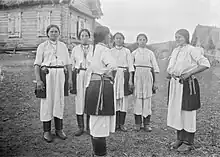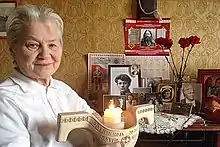Эрзят | |
|---|---|
 | |
 Erzya women | |
| Total population | |
| 57,008[1] (2010, census) | |
| Regions with significant populations | |
| Languages | |
| Erzya, Russian | |
| Religion | |
| Orthodox Christianity, Erzyan native religion, Lutheranism | |
| Related ethnic groups | |
| Other Volga Finns, particularly Moksha and Mari |
The Erzyas (also Erzyans, Erzya people; Erzya: эрзят, romanized: erzat, Russian: эрзяне, romanized: erzyane) are one of the Mordvin peoples.[2]
Famous people of Erzya descent

Erzya girls, 1914

Erzya woman holding a shtatol
- Purgaz
- Syreś Boläeń, public figure, poet and translator, half-Erzya
- Stepan Erzia, Russian sculptor
- Nadezhda Kadysheva, Russian singer
- Vasily Chapayev, Bolshevik commander
See also
References
Wikimedia Commons has media related to Erzya people.
Erzya edition of Wikipedia, the free encyclopedia
- ↑ "Официальная публикация итогов Всероссийской переписи населения 2010 года. Т. 1. Численность и размещение населения". Федеральная служба государственной статистики (in Russian). Russian Federal State Statistics Service. 2010.
- ↑ Erza We Are!, Two languages – two nations
This article is issued from Wikipedia. The text is licensed under Creative Commons - Attribution - Sharealike. Additional terms may apply for the media files.